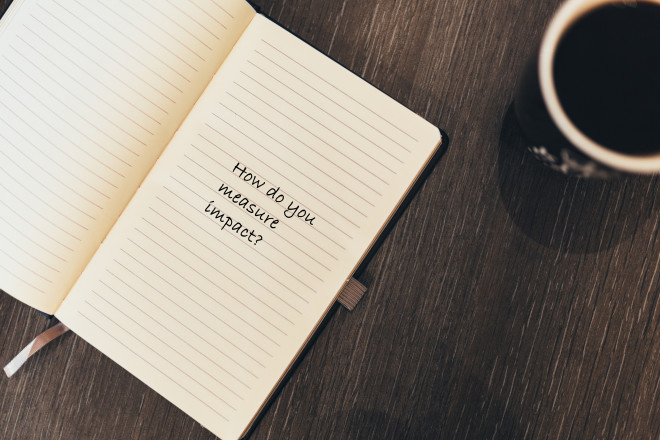Student Perspective: Measuring Impact on “Dollars and Change”, Week of July 30
Wharton Social Impact Fellows Petra Nichols and Samantha Klein spent a portion of their summer fellowship in the studio with us, tuning in to a live recording of “Dollars and Change,” SiriusXM’s only show devoted to social impact and business.
Here, the fellows shares their takeaways from our episode on July 30, hosted by Sherryl Kuhlman and Jacob Gray. Listeners can hear WSII on the radio every Thursday morning from 8-10 a.m. ET, or streaming online all week.
How do you measure the impact of your dollars? Do your ultimate outcomes matter, or is it better to track smaller milestones?
In a race to define impact measurement, these are the million-dollar questions organizations are hoping to answer.
On a recent episode of “Dollars and Change,” several guests explored this fascinating and complicated topic. Hosts Jacob Gray and Sherryl Kuhlman were also joined by Stephanie Kim, WSII’s Manager of Community Impact, for a lengthy discussion segment.
Stephanie introduced the idea of impact measurement as an integral aspect of charity management. “Philanthropy is getting smarter,” she said, by demanding to know the direct impact of its money. However, Stephanie says there can be, “huge confusion between outputs and outcomes.”
Outputs are easily quantifiable daily accomplishments by an organization, such as the number of workshops they hold. Outcomes are intangible long-term effects of an organization’s programs, like eradicating poverty or providing healthcare in a certain area. It turns out that these impact measurements only matter to large donors, but not to the majority of small donors. The problem for charities and social ventures alike is the hygiene factor and the lack of comparison, or having nothing to measure against.
Later, guest Doug Balfor joined the hosts in studio. As CEO of Geneva Global, a philanthropic consulting company, Balfor and his team help organizations and high net worth individuals be more effective investors and donors by connecting them with NGOs in the area of their interest.
Philanthropists want a multiplier effect, so Balfor leverages donations to create neutral collaborative vehicles between community organizations and even public-private partnerships. Despite the challenges in ensuring effective and impactful philanthropy, Balfor maintains, “I’ve never been more positive about the impact we’re having.”
For the third segment, David Medina, the COO and co-founder of Results for America called in.
Results for America helps government decide which projects will have the most impact. In short, Medina says they provide, “Moneyball for government,” referencing the movie about using statistics in the baseball draft to create a winning team. By collecting data for evidence, Results for America can determine that a program like Head Start is very ineffective, while the program “What Works Cities” has had an enormous effect.
In New Orleans, the program removed 10,000 properties from blight. Though most departments spend less than 0.001% of their budgets on evaluations, Medina points out that an evidence-driven agenda can unite both sides of the aisle and ultimately improve government services.
Soushiant Zanganehpour, the founder and managing director of TriBeCa Management Consulting, joined us on the line for the show’s final segment. He notes that millenials in emerging markets are driving the increase in social ventures. In his experience, more developed countries are not as willing to make the supposed compromise between impact and financial gain.
In emerging economies, Zanganehpour attributes the higher motivation for social impact to, “opportunity meets pessimism,” meaning emerging markets have higher rates of corruption and institutional failure. To combat the perception of risk, Zanganehpour’s answer is to, “keep building practical examples,” of success.
Ultimately, evidence seems to be the name of the game. Impact measurement is so hard to define, to me the radio show complicated it more as the guests pointed out that NGOs, governments, and social ventures all face distinct challenges in satisfying their donor, tax, and investment bases, respectively. The good new is, each guest emphasized their partnerships, so hopefully they will conclusively define impact measurement by working together.
 Petra Nichols, C’16, is a rising senior majoring in International Relations and Hispanic Studies at Penn. As an Investing in Women Fellow at WSII, she researches ways that impact investing furthers development by focusing on women’s empowerment.
Petra Nichols, C’16, is a rising senior majoring in International Relations and Hispanic Studies at Penn. As an Investing in Women Fellow at WSII, she researches ways that impact investing furthers development by focusing on women’s empowerment.
 Samantha Klein, C’16 is a rising senior in the college majoring in Health and Societies. She is a member of the Turner Social Impact Society and is excited to be spending her summer as an Investing in Women Fellow at WSII.
Samantha Klein, C’16 is a rising senior in the college majoring in Health and Societies. She is a member of the Turner Social Impact Society and is excited to be spending her summer as an Investing in Women Fellow at WSII.



